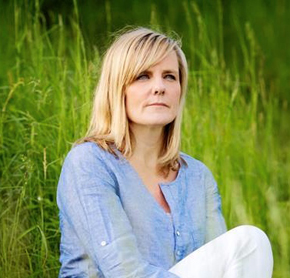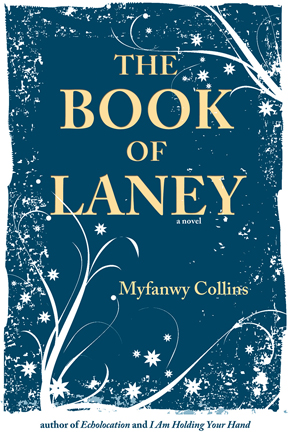An Interview with Myfanwy Collins
by Karin Cecile Davidson
 Myfanwy Collins is a novelist and short-story author who writes of the people and places she knows by memory and by heart—the hardworking and hard-worn of the Northeast, from the shorelines of Massachusetts to the Adirondacks in New York all the way up to Canada. Her novels “The Book of Laney” (Lacewing Books, 2015) and “Echolocation” (Engine Books, 2012) share vast and beautiful landscapes wrapped in ice and lit with moonlight; themes of loss, retribution, and recovery; and characters who track their way through violence to love.
Myfanwy Collins is a novelist and short-story author who writes of the people and places she knows by memory and by heart—the hardworking and hard-worn of the Northeast, from the shorelines of Massachusetts to the Adirondacks in New York all the way up to Canada. Her novels “The Book of Laney” (Lacewing Books, 2015) and “Echolocation” (Engine Books, 2012) share vast and beautiful landscapes wrapped in ice and lit with moonlight; themes of loss, retribution, and recovery; and characters who track their way through violence to love.
“The Book of Laney” is a novel meant for young adults, although its story resonates with adult audiences. Told from the viewpoint of 15-year-old Laney, a girl who has experienced enormous loss, the novel travels from an event of horrific violence into a world that is off the grid, a place of wild serenity, one in which survivors carry on. “Echolocation” presents a very similar setting, one of the Adirondacks in winter; however, shifting perspectives of multiple characters, each with her or his own agenda, crisscross in conflict with the hope of conciliation. Both novels directly address violence in our society, from school shootings to suicide, taking us inside the acts in order to convey the underlying causes and the painful outcomes. The writing is powerful and poetic and engages the reader in serious thought.
KARIN CECILE DAVIDSON: Your books “Echolocation” and “The Book of Laney” are published by small presses Engine Books and Lacewing Books, respectively. With Lacewing Books being an imprint of Engine Books for young adult audiences, it seems you’ve found a perfect crossover from adult to young adult fiction within the same family of presses.
How was the experience of working with Victoria Barrett and Andrew Scott, a dedicated literary team and the respective editors of Engine Books and Lacewing Books, from start to finish—that is, in terms of submission, acceptance, revision, and publication?
MYFANWY COLLINS: Well, it’s been absolutely wonderful. Of course, Victoria is the publisher as well as the editor of Engine Books, while Andrew is the editor of Lacewing Books. He’s been quite vocal about saying that Engine Books is Victoria. Her baby. Her dedication. And that he works for her (as opposed to them splitting the work fifty-fifty). These are two of the kindest, most generous, and hardworking people I have ever had the pleasure of meeting. Not only do I admire them in a professional capacity but I also love them as human beings.
A fiddlehead pushing up from beneath a compost of leaves, bright green and delicate. I was touched by its strength and lost in how the light illuminated it. The fiddlehead had pushed up through the darkness and lived. Despite being covered over and forgotten through the long, cold winter, it had beaten the odds and survived. –Laney in “The Book of Laney” by Myfanwy Collins
DAVIDSON: The act of survival is an important thematic element in your writing, Myfanwy. With this in mind, Laney seems more than a character, reaching beyond the page to a higher sort of existence. To me, she is a metaphor of strength and survival.
Would you tell us about this recurring theme in your writing? And did your creation of Laney bring this to a new level?
 COLLINS: I love that you approached her as metaphor as well as character. I think a lot about survival. Laney is essentially exiled and placed into a world where she must learn the physical aspects of survival (chop wood; carry water) and the mental aspects (self-reliance). Then there is the larger question of how we survive in the world of violence, rage, antipathy. All you have to do is spend time online to see that we are doing a horrible job of understanding each other. What Laney learns is how to live within another’s skin. She learns empathy, and learning that is the key to her survival. So if there is a message, that is mine. It’s certainly something I constantly work on within myself, to be better at empathizing. This is the gift we have as human beings, this ability to live within another and see the world through their eyes.
COLLINS: I love that you approached her as metaphor as well as character. I think a lot about survival. Laney is essentially exiled and placed into a world where she must learn the physical aspects of survival (chop wood; carry water) and the mental aspects (self-reliance). Then there is the larger question of how we survive in the world of violence, rage, antipathy. All you have to do is spend time online to see that we are doing a horrible job of understanding each other. What Laney learns is how to live within another’s skin. She learns empathy, and learning that is the key to her survival. So if there is a message, that is mine. It’s certainly something I constantly work on within myself, to be better at empathizing. This is the gift we have as human beings, this ability to live within another and see the world through their eyes.
The field was golden stalks of long-past-summer grass, dead and waiting for snow. Rust colored milkweed leaves dotted the landscape here and there along with bright red chokecherries. A line of denuded sugar maples and firs circled the land, leading to a darkening woods. –Cheri in “Echolocation” by Myfanwy Collins
Winter came on quick. The tree frogs quit singing me to sleep in early October. By November there was snow. From December on, I felt ice in everything I did, moving across my words as I spoke them, covering over my breath … Ice was everywhere, crystalline and hard-edged. –Laney in “The Book of Laney” by Myfanwy Collins
DAVIDSON: The beauty of the prose in descriptions of setting and season are weighted against the complicated relationships of the characters and the violence that entraps them. In the passages above, Cheri and Laney speak of winter’s arrival, how the bright world is suddenly dimmed.
Please tell us about your characters’ relationships with the setting, how the natural world affects them and their stories.
COLLINS: I live on a barrier island. Often during stormy weather, the island is shut off from the outside world, the road leading onto the island flooded over. It can be a difficult place to live, but it is also exquisitely beautiful. I have come here during a challenging time in my life to get back to myself. To witness the sunrise and the sunset. The tides. The storms. And to witness my own rebirth and re-establish my self-reliance. I grew up in a remote and beautiful place. Life there was not easy, but it taught us a lot about how to survive in the world. What we all lacked for in creature comforts, we made up for in heart. All this is to say that the relationship my characters have with their setting, with the natural world, is my own.
What happened was a catastrophe. It was a bloodbath. It was everything. But I wasn’t there, and so I’ve had to patch together the story. This is what I have heard from reports and rumors. This is what I have from my own experience and recollection. This is what I know. –Laney in “The Book of Laney” by Myfanwy Collins
DAVIDSON: In “The Book of Laney” there are several ways in which we learn of the violence Laney’s brother, West, and his friend have committed—through a journal called “The Book of West,” which Laney discovers and through Laney’s visions of others’ past experiences. Telling the story of the aftermath of a school shooting via the mind of a teenage girl is brilliant and wise. In the same way, first-person viewpoints certainly lead to challenges in relating past events in which the narrator has not been present.
How did you come upon these creative paths through which Laney could reveal background details?
COLLINS: One option to show the entire story would have been to write the book in third person, but that didn’t feel right to me. I wanted to be able to more fully embody Laney and her voice, which is why I chose first person. Of course, this narration has its shortcomings, and there was so much that I wanted Laney to know. Partly, the rest of the story came to her through West’s writing. Otherwise, it was through her visions. Her visions are meant to be a physical manifestation of empathy. Finally, she learns the story through those around her—Meme being the final storyteller. In the end, though, Laney takes over her own story. She lets go of West. She becomes singular and, ultimately, first person, present tense.
The moon does not belong to everyone … If I could, I would push away the moon from myself forever. I do not deserve the moon. –Laney in “the Book of Laney” by Myfanwy Collins
Betrayal meant nothing. Especially to a woman who had run away with a child that no more belonged to her than the sky belonged to the moon. –Renee in “Echolocation” by Myfanwy Collins
 DAVIDSON: In your novels, the moon, whether bare or crossed with cirrus clouds, lights the way, and yet the characters feel undeserving of its radiance. The moon seems to promise pathways to something better, something hopeful, but its light is also complicated with thoughts of bad luck, betrayal, silence, and mourning.
DAVIDSON: In your novels, the moon, whether bare or crossed with cirrus clouds, lights the way, and yet the characters feel undeserving of its radiance. The moon seems to promise pathways to something better, something hopeful, but its light is also complicated with thoughts of bad luck, betrayal, silence, and mourning.
Would you tell us about this?
COLLINS: The moon is predictable. It is powerful. Living at the ocean, I witness its power every day. At low tide. At high tide. The moon is like our backstory, our family, spinning around us, pushing and pulling us this way and that. However, we don’t have to remain powerless to the force of our past. We can break away from it or harness it to make us stronger. We can see the tide as the cleansing force, smoothing out the sand and preparing it for a fresh set of footprints. A new path.
I slipped my compass in my pocket and thought of it throughout the day, the red arrow and my heart both pointing north. –Laney in “The Book of Laney” by Myfanwy Collins
DAVIDSON: The compass Laney’s grandmother gives her and teaches her to use is symbolic of direction, of finding one’s way back to love and compassion, to whatever normalcy can be found after the kind of loss that violence brings. True north is the direction Laney feels pulled to.
Is this also a direction you are pulled to in your writing? What is it about the North Country that calls to you as a writer?
COLLINS: It is the direction I am pulled in. Yes. I grew up in the North Country. I lived in the suburbs of Montreal until I was 11, but every summer was spent in the northern Adirondacks. It is where I came of age and, as such, it will always be a part of me. It’s also where I learned self-reliance and taught myself to survive in the world. It is forever in my heart.
It is a rugged, beautiful place. The winters are long and brutal, but the people find their way through, and when they do, there is spring.
I also tend to write about farther north because I have a difficult time writing fiction rooted in my present. I need the gift of distance and time in order to truly see the whole picture.
DAVIDSON: Of “Echolocation,” author Pia Z. Erhardt has commented that the “novel calls to mind the grim and radiant work of Daniel Woodrell, whose novels include “Winter’s Bone” and “The Death of Sweet Mister.”” I would agree that this also is true of “The Book of Laney,” as there truly is a similar way in which both novels capture the raw beauty of place and people.
Is Woodrell among the writers who have influenced your work? Who are the writers that inspire you, who you return to?
COLLINS: One writer I always return to, as one who has not only influenced with her books but also with her guidance, is Dorothy Allison. I remember when I first read “Bastard Out of Carolina” as a young writer, I was undone. So many reasons why. First of all, the story was completely harrowing. But then also I had a massive realization: the truth is ugly and we can write the truth. We don’t need to hide from it. We can be honest. And even if that honesty is ugly and painful, there is beauty in releasing it.
Other than Allison, the writers who influenced me most, however, are those of my childhood and young adulthood. Judy Blume. S. E. Hinton. Paul Zindel. Lucy Montgomery. Laura Ingalls Wilder. And Carson McCullers, whose book (play) “The Member of the Wedding” remains one of my favorites. It’s a book that is appropriate for all audiences, easily slipping into the hands of a young adult as well as an adult.
As a writer, that’s what I aspire to, helping to broaden the worldview of a young person and also to help heal the broken vision of the adult.
Mostly, though, the work that moves me most is less about who wrote it, but is more about work that magnifies honesty, and, of course, empathy. When the books we read allow us to truly feel the lives of others—their wounds, their failures, their successes, their love—we learn how to live a more fully realized life. We learn how to survive.

Karin Cecile Davidson, Interviews Editor

0 comments on “Interviews: Myfanwy Collins”